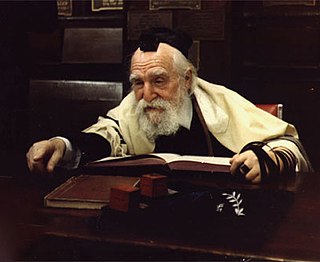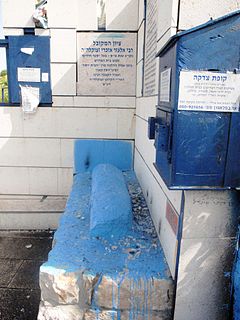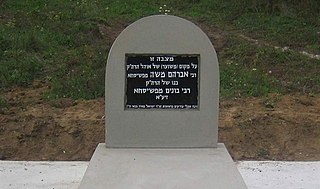Related Research Articles

Rabbi Moses Isserles, also known by the acronym Rema, was an eminent Polish Ashkenazic rabbi, talmudist, and posek.
Negiah, literally "touch", is the concept in Jewish law (Halakha) that forbids or restricts sensual physical contact with a member of the opposite sex. A person who abides by this halakha is colloquially described as a shomer negiah.
Rabbi Moses ben Jacob of Coucy, also known as Moses Mikkotsi, was a French Tosafist and authority on Halakha. He is best known as the author of one of the earliest codifications of Halakha, the Sefer Mitzvot Gadol.

Yaakov ben Moshe Levi Moelin was a Talmudist and posek best known for his codification of the customs (minhagim) of the German Jews. He is also known as Maharil - the Hebrew acronym for "Our Teacher, the Rabbi, Yaakov Levi" - as well as Mahari Segal or Mahari Moelin. Maharil's Minhagim was a source of law for Moses Isserles’ component of the Shulkhan Arukh.
The Ozerov Hasidic dynasty is a Hasidic group that began in 1827 when Rabbi Yehudah Leib Epstein, Rabbi of Ożarów in Poland since 1811, assumed leadership of his Hasidim ("disciples"). Ozerov is known for its learning, as one of the intellectual Hasidic dynasties.
Moshe Schick was a prominent Hungarian Orthodox rabbi. In rabbinical commentary Shik is commonly known as the Maharam Schick ; Maharam is the Hebrew acronym for Moreinu Harav Moshe, which means "Our Teacher Rabbi Moses".
Yaakov Yitzchok Ruderman was a prominent Talmudic scholar and rabbi who founded and served as rosh yeshiva of Yeshivas Ner Yisroel in Baltimore.

Michel Yehuda Lefkowitz was a respected Haredi Lithuanian Torah leader and rosh yeshiva in Bnei Brak, Israel, for over 70 years. He was a maggid shiur at Yeshivas Tiferes Tzion from 1940 to 2011 and rosh yeshiva of Yeshivas Ponovezh L’Tzeirim from 1954 to 2009, raising thousands of students. He was a member of the Moetzes Gedolei HaTorah of Degel HaTorah, a member of Mifal HaShas, and nasi (president) of the Acheinu kiruv organization, and played a leading role in the fight for Torah-true education in yeshivas and Talmud Torahs in Israel. In addition to his own Torah works, he published the teachings of his rebbi, Rabbi Shlomo Heiman, in the two-volume Chiddushei Shlomo.

Moshe Feinstein was an American Orthodox rabbi, scholar, and posek. He has been called the most famous Orthodox Jewish legal authority of the twentieth century and his rulings are often referenced in contemporary rabbinic literature. Feinstein served as president of the Union of Orthodox Rabbis, Chairman of the Council of the Moetzes Gedolei HaTorah of the Agudath Israel of America, and head of Mesivtha Tifereth Jerusalem in New York.

Rabbi Elazar ben Moshe Azikri (1533–1600) was a Jewish kabbalist, poet and writer.
Moses, Moishe, Moshe, or Movses is a male given name, after the biblical figure Moses.

Yehoshua Dovid Povarsky is known for his erudite Talmudic lectures and his deanship as Rosh Yeshiva of Ponevezh Yeshiva. He was asked by Yosef Shlomo Kahaneman to join the previous two heads of the institute, Elazar Menachem Shach and Shmuel Rozovsky to create a triumvirate in leading the Yeshiva.
Moshe ben Avraham Provençal (1503–1576) was an Italian posek, Hebrew grammarian, and mathematician.
Moshe Sofer (II) (1885–1944) was a prominent Orthodox Jewish (Charedi) Rabbi in the early 20th century. He was Dayan of Erlau, Hungary and author of a halachic responsa sefer named Yad Sofer.

Yehudah Yudel Rosenberg was a rabbi, author, and Jewish communal leader in Poland and Canada. He is best known for his Hebrew translation of the Zohar, and for popularizing the tale of the Golem of Prague.

Moshe Aharon Poleyeff was an American rabbi, teaching at Yeshiva University (YU) in New York where he was a Rosh Yeshiva for over 45 years, training generations of rabbis, including Rav Mordechai Gifter.
Rabbi Moshe Rosen, known by the name of his magnum opus, Nezer HaKodesh on Kodashim, was a Polish Orthodox rabbi who befriended the Chazon Ish while serving as a rabbi in Lithuania and later became a well respected Torah scholar in the United States of America.

Avraham Moshe Bonhardt of Peshischa also known as the Illui Hakudosh was the contested third Grand Rabbi of Peshischa, succeeding his father R. Simcha Bunim Bonhardt of Peshischa, after his father's death in 1827. He led the less radical sect of Peshischa for two years, until his death in 1829, after which his followers adopted R. Israel Yitzhak Kalish of Vurka as his successor.
Moïse Milliaud was a French rabbi and poet.

Rabbi Meir Ashkenazi was a Chabad rabbi who served as chief Rabbi of Shanghai from 1926-1949.
References
- ↑ "Rabbi Moshe Stern - kevarim.com". kevarim.com. Retrieved 9 April 2018.
- ↑ "HebrewBooks.org Sefer Detail: באר משה - חלק א-ב -- שטרן, משה בן אברהם, 1914-1997". hebrewbooks.org. Retrieved 9 April 2018.
- ↑ "Gedolim Yahrzeits: 2 Av, Rav Moshe Stern"".